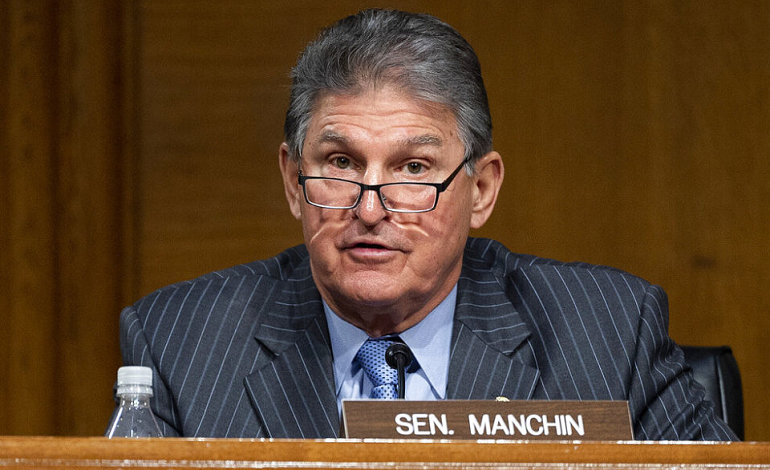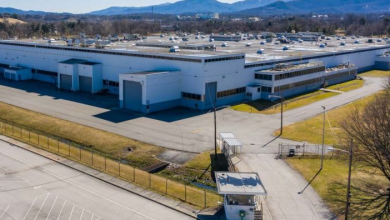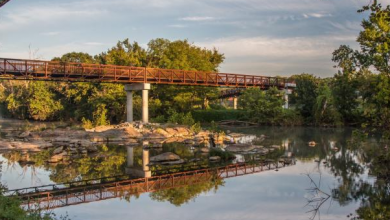Sen. Joe Manchin’s maneuvers for Mountain Valley Pipeline not necessarily certain to succeed

When there’s a legal battle brewing over the Mountain Valley Pipeline, supporters would rather see it play out in the federal courthouse in Washington, D.C. — not one 100 miles to the south in Richmond.
The U.S. Court of Appeals for the District of Columbia is largely deferential to pipeline approvals by the Federal Energy Regulatory Commission, legal experts say. The appellate court upheld a FERC decision that greenlighted Mountain Valley in 2017, and more recently rejected challenges to the commission’s approval for an extension of the pipeline.
In Richmond, where the 4th U.S. Circuit Court of Appeals sits, the pipeline has not fared as well. The Fourth Circuit has stayed or struck down nearly a dozen permits issued to Mountain Valley by other federal agencies.
Joe Manchin hopes to change that.
The U.S. senator from West Virginia, a staunch supporter of Mountain Valley, struck an agreement with Democratic leaders earlier this month that would make Washington, D.C., the exclusive venue for future legal challenges.
But should Manchin’s proposed legislation be passed, there’s no guarantee that it would ensure the completion of a litigation-battered and long-delayed natural gas pipeline that passes through the New River and Roanoke valleys.
“It would be foolhardy to say that this is a fait accompli now,” said Cale Jaffe, a law professor and director of the Environmental Law and Community Engagement Clinic at the University of Virginia.
First, there’s the unusual nature of Manchin’s venue proposal, which some lawyers likened to switching referees in the middle of a ballgame.
“We seldom see a legislative intervention in litigation to change the court in which legal challenges are to be filed,” said Steve Emmert, a Virginia Beach lawyer who founded and is past chair of the appellate practice section of the Virginia Bar Association.
Under current federal law, challenges to an approval by FERC — the lead agency that oversees interstate projects such as Mountain Valley — go to the D.C. Court of Appeals. Petitions that seek to overturn secondary permits issued by other government agencies wind up before the appellate court in the district where the project is located, which for Mountain Valley is the Fourth Circuit.
Even if the proposal were to become law, some legal experts said Mountain Valley may not necessarily find a more sympathetic forum in the D.C. Court of Appeals, which in recent years has become more willing to scrutinize FERC decisions.
“On the whole, I wouldn’t expect the change of venue to make that much of a difference,” Alison Gocke, an associate professor of law at UVa’s law school, wrote in an email.
“These are both circuits that have a record of thoughtful decisions that try to faithfully apply the law, and I would imagine challenges to the MVP would be treated and reviewed similarly in both.”
‘Court case after court case’
Mountain Valley hit its first legal roadblock in 2018, just a few months after work started on a deeply controversial pipeline that runs for 303 miles from northern West Virginia through Southwest Virginia to connect with an existing pipeline near the North Carolina line.
A three-judge panel of the Fourth Circuit struck down a permit from the U.S. Forest Service for the pipeline to pass through a 3.5-mile section of the Jefferson National Forest, voicing concerns about erosion and sedimentation caused by digging trenches for a buried pipe along steep mountainsides.
The court later stayed approvals from the U.S. Army Corps of Engineers for the pipeline to cross under nearly 1,000 streams and wetlands. And it rejected an opinion from the U.S. Fish and Wildlife Service that endangered species — including fish such as the Roanoke logperch and the candy darter — would not be jeopardized by the construction.
Mountain Valley is seeking new permits, which are likely to be challenged yet again by the same environmental and community groups.
Noting that the same three judges presided over most of the cases, Mountain Valley asked the court to randomly select the next panel, writing in court documents that continuing with the same trio would “undermine public trust in the judicial process.” In June, the court denied the motion without comment.
Manchin, meanwhile, was becoming more outspoken about his frustrations with what he called a bogged-down permitting process.
“It has run into court case after court case after court case,” Manchin said during a meeting of the Senate’s Committee on Energy and Natural Resources, which he chairs. “This product needs to get to market.”
As arguably the most conservative Democrat in the Senate, Manchin’s support for key priorities of his party and the White House is often elusive in the evenly divided chamber.
So it was a major breakthrough in early August when he struck an agreement with Senate Majority Leader Chuck Schumer, House Speaker Nancy Pelosi and President Joe Biden. Manchin agreed to vote for the Inflation Reduction Act, a sweeping law that includes spending for renewable energy to fight climate change. The measure also aims to lower the cost of prescription drugs and pay down the national debt.
In return, the Mountain State’s senator was promised Democratic support for one of his pet projects — a reform of the permitting process that governs energy infrastructure projects such as natural gas pipelines. The measure would set timelines for reviews and impose limits on “excessive litigation.”
A one-page summary of the package includes a single line labeled “Complete the Mountain Valley Pipeline.”
It calls for relevant federal agencies to “take all of the necessary actions to permit the construction and operation” of the project, while giving “the DC Circuit jurisdiction over any further litigation.”
A change of heart?
It was early April, and any home-court advantage that Mountain Valley might have in the nation’s capital was not apparent.
A three-judge panel of the D.C. Court of Appeals was hearing oral arguments in a lawsuit brought by the Sierra Club and other environmental groups. At issue was a decision by FERC in 2020 that extended by two years a deadline for the pipeline’s completion, allowing work to resume despite the lack of permits struck down by the Fourth Circuit.
Judge Patricia Millett said it “just seems troubling” that FERC had not ordered all construction to halt after the Fourth Circuit’s rulings.
She also questioned Mountain Valley’s explanation, which was accepted by the commission, that “historic rainfall” in 2018 was to blame for repeated problems controlling muddy runoff from construction sites.
“The historic rainfall wasn’t for a full year, this wasn’t like the times of Noah,” Millett told a FERC attorney.
The D.C. Circuit has yet to rule on the case. But some observers say the exchange that occurred April 7 is part of a broader pattern: An appellate court long seen as FERC-friendly is becoming less so.
“Over the last couple years, the D.C. Circuit has been increasingly willing to scrutinize FERC’s pipeline decisions, and in several important decisions the Court has remanded cases back to FERC for violations of the National Environmental Policy Act and the Natural Gas Act,” Gocke said.
She added that it’s too early to discern whether there has been a fundamental shift, or to explain what’s behind it.
“There has been a lot of activity and advocacy by many environmental groups, community groups, and landowner groups over the years — it’s possible this advocacy has encouraged the Court to look more closely at these cases,” she said.
Some of D.C. Circuit’s recent rulings have focused on greenhouse gas emissions, and whether FERC took proper steps to evaluate that impact in approving fossil fuel projects.
Gocke said it’s possible that “as climate change has become a more salient issue, the Court has been more willing to look closely at pipeline approvals. But that’s speculation on my part; I don’t think we know why.”
Legislative outlook unclear
Equally uncertain, it seems, are the details of Manchin’s proposal to streamline the permitting process for energy projects, and how it might fare in Congress.
No legislation has been introduced yet, although the senator’s office says that Schumer and Pelosi have agreed “to move a comprehensive permitting reform package before the end of the fiscal year on Sept. 30, 2022.”
Sen. Tim Kaine, D-Va., said there is no explicit agreement that Marchin’s support for the Inflation Reduction Act means that his separate legislation will get the backing it needs.
“No one’s made a commitment on how they will vote, and I’m certainly not going to make a commitment until I see what’s in the bill,” Kaine said in a recent video session with reporters.
Rep. Morgan Griffith, a Republican whose 9th District is crossed by the pipeline, also says he doesn’t know enough now on which to base a decision.
“While I support permitting reform generally, I have heard from many constituents opposed to the MVP,” he said in a statement last week. “I also have my own concerns about the process the Federal Energy Regulatory Commission followed for permitting the MVP.”
It is possible that Manchin’s permitting package will be included in broader legislation — such as a bill to continue funding the operations of the government — that would be difficult for lawmakers to oppose, according to Arbo, a Washington, D.C., firm that provides legal counseling for large energy infrastructure projects.
“That could ease its passage,” a recent post on Arbo’s blog stated.
“Otherwise, it would be difficult to see how the required votes can be obtained because many Democrats will likely oppose aspects of the permitting reform legislation, and it is far from certain that Republicans would be inclined to help Senator Manchin get it passed,” considering his vote that assured passage of the Inflation Reduction Act, the blog post stated.
Although many questions remain, Arbo said, “the benefits to MVP could be substantial” if the legislation passes.
A statement from Mountain Valley praised the concept of Manchin’s proposal without commenting on its impact to the pipeline specifically.
Spokeswoman Natalie Cox wrote in an email that it “would address issues that have presented costly, time-consuming delays in the construction of energy infrastructure projects and supports Americans’ demands to execute a timely transition to clean energy, while at the same time ensuring energy reliability and affordability.”
“By providing a timely and certain permitting process, the proposed legislation would benefit all energy infrastructure projects, which is just as important for renewable energy infrastructure projects as it is for oil and gas,” Cox said.
Before the Manchin deal was announced, the consulting firm put the odds of Mountain Valley meeting its goal of finishing work on the pipeline by the end of next year at just 27%. Its chances now stand at 70%, Arbo says.
Although environmentalists are pleased with many parts of the Inflation Reduction Act — which includes record federal spending on clean energy — some say the tradeoff for Manchin’s support hurts those in the pipeline’s path.
“Communities in Appalachia are not a sacrifice zone,” said Grace Tuttle of the Protect Our Water, Heritage, Rights coalition. “Tell President Biden to stop the Mountain Valley Pipeline, now.”
No direct effect for wind farm project
The climate legislation, meanwhile, would not directly help a proposed wind farm in Botetourt County — which would be the first of its kind in Virginia — but will likely have secondary benefits.
“It will provide more support and a better environment for all renewable energy projects,” Patrick Chilton, a spokesman for Apex Clean Energy, said in an email Friday.
Apex is proposing a wind farm to be built on the ridgeline of North Mountain, about 5 miles northeast of Eagle Rock. Rocky Forge Wind would consist of 13 turbines, each one 643 feet tall.
The project has encountered delays caused by difficulties finding a buyer for the renewable energy and by lawsuits filed by opponents.
“The legislation will create more clean power, more jobs, and more stability for the industry. This will drive investment in and deployment of renewables in Virginia and across the country,” Chilton said.
“If passed, the new and expanded tax credits for renewables would remain on the books for a decade, providing unprecedented certainty for developers to plan future projects.”




